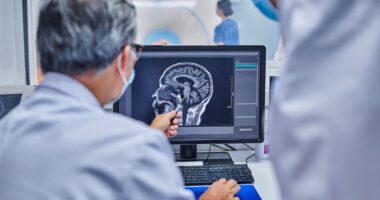Share this @internewscast.com
Losing your sense of direction in middle age could be a warning of Alzheimer’s disease years before symptoms start.
Researchers found adults at risk of dementia due to genetic or lifestyle factors had reduced spatial navigation up to 25 years earlier.
They believe that testing someone’s ability to find their way around using virtual reality could lead to life-changing early diagnosis.
Dr Coco Newton, of University College London, said: ‘Our results indicated that this type of navigation behaviour change might represent the very earliest diagnostic signal in Alzheimer’s disease.
‘We are now taking these findings forward to develop a diagnostic clinical decision support tool for the NHS in the coming years, which is a completely new way of approaching diagnostics and will hopefully help people to get a more timely and accurate diagnosis.’

Researchers found that people at greater risk of developing Alzheimer’s were selectively impaired on the navigation task
Risk factors for Alzheimer’s include a faulty gene, family history of the condition and low physical activity.
The study, published in Alzheimer’s & Dementia: The Journal of the Alzheimer’s Association, tested the cognition and directional skills of 100 at-risk individuals aged 43 to 66.
Researchers found that people at greater risk of developing Alzheimer’s were selectively impaired on the navigation task, without an impairment on other cognitive tests.
As well as early diagnosis, it’s hoped the study could help scientists understand the progression of Alzheimer’s better.
Dr Richard Oakley, of the Alzheimer’s Society, said the study offered ‘exciting’ opportunities for the future.
He said: ‘One in three people born today will go on to develop dementia, and early and accurate diagnosis are vital for people to access the right support, plan for the future, and receive appropriate treatment.
‘Very early symptoms of dementia can be subtle and difficult to detect, but problems with navigation are thought to be some of the first changes in Alzheimer’s disease.
‘It will be exciting to see how this research may offer a way to spot disease-specific changes early and help people living with dementia in future.’















